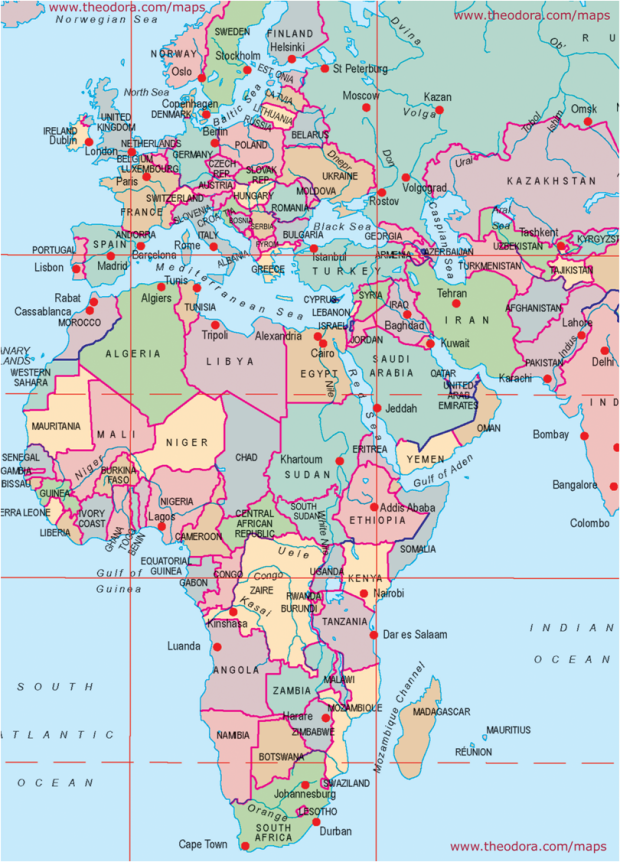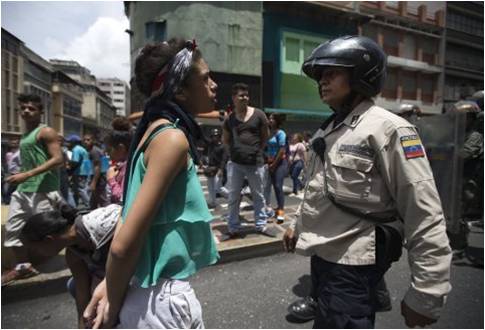10 million people on the verge of starvation
The world is facing a situation unprecedented since the Second World War in terms of people judged to be in danger of starvation. Ten million people in four different countries face imminent starvation which, according to the United Nations and relief organizations, is the result of war, political instability and environmental factors.

Countries where 20 million people at risk of starvation: Yemen, South Sudan, Somalia and northern Nigeria. The UN agency blamed a combination of war, political instability and environmental factors
The newest country in the world, South Sudan, which only won independence in 2013, is wrought by a brewing civil war, a fight between the president and vice president who come from different ethnic groups and claim legitimacy in ruling the country. The country has substantial oil and gas reserves but despite its natural endowments, most of the population is mired in poverty. A drought has exacerbated an already difficult situation.
Another country in the midst of a civil war, spurned by the different interpretations of Islam of the Shiite minority and the Sunni majority, is Yemen, strategically located on the south-eastern tip of Saudi Arabia. It is the latest arena of the deadly civil war going on within Islam, conflicts which indirectly involve Saudi Arabia and Iran, the former backing Sunni groups, the latter Shiite ones. Yemen has been wracked by political instability for decades, at one point divided between North and South Yemen.
Ever since the US invasion of Somalia in 1992, Somalia has fit into the new category of failed state, a country where there has been institutional breakdown and governing has been based on who has the biggest guns. Where there is chaos, there is violence, and the fundamentalist group Al-Shabab is active in wanton acts of terrorism. The recent drought has crippled an already country barely crawling along, and hundreds of thousands of people are now vulnerable to starvation.
Despite its considerable petroleum reserves, Nigerians in their majority continue to live in squalid conditions and corruption ensures this same population sees few benefits from oil exports. A brutal group in the Islamic North, Boko Haram, which means non-Islamic education is a sin, has wrought havoc on communities and 120,000 under their control are said to be on the verge of starvation.
Upping the Ante

Weeks of rising tensions between the US and North Korea continue to feed uncertainty about what is going to happen in the event of further missile tests by North Korea and the US insistence that these not occur. The implications of a war are sobering given that within seconds of any attack on North Korea, that country would likely immediately retaliate with attacks on Seoul with the potential of thousands of deaths, unseen since the second world war. It is unclear how much leverage China has over its ‘ally’ Kim Jong-un and whether Donald Trump would actually attack the country. These uncertainties and military posturing by both sides create the conditions for miscalculations or even mistakes with tremendously far-reaching consequences.
Possible Vaccine Against Malaria
 The World Health Organization (WHO) has announced that it will test a vaccine against malaria on a trial basis in Africa next year. There is much hope that this could become an effective tool in the fight against the disease that kills half a million people a year and afflicts up to 500 million, 90% of them in sub-Saharan Africa, one of the poorest regions of the world. Other tools being tried are genetically modified mosquitos which could stop the spread of the parasite. Simpler measures, such as the provision of mosquito nets, are also used to combat this harmful disease.
The World Health Organization (WHO) has announced that it will test a vaccine against malaria on a trial basis in Africa next year. There is much hope that this could become an effective tool in the fight against the disease that kills half a million people a year and afflicts up to 500 million, 90% of them in sub-Saharan Africa, one of the poorest regions of the world. Other tools being tried are genetically modified mosquitos which could stop the spread of the parasite. Simpler measures, such as the provision of mosquito nets, are also used to combat this harmful disease.
Venezuela Teetering on the Brink
The country of Venezuela has suffered from civil unrest over the month of April, with twenty nine people having died during this period as street demonstrations by those in opposition to Nicolas Maduro’s rule have turned violent and lethal.

Those protesting are unhappy with the government, founded on the principles of Hugo Chavez’s form of “Bolivarian Revolution,” which has struggled to maintain the system shaped by the charismatic Chavez, and has been especially hit by low oil prices, Venezuela’s principal export. The economy is catastrophic and inflation is up to 700%. Many people are eating only two meals a day, and hours are needed to line up for food that often never arrives.
Both sides seem equally entrenched, with Maduro relying on the legions of loyal working class and poor Chavistas, who see that this government as the first to ever consider their needs, to ensure a degree of popular support. The opposition, mostly middle class and white, clamors for Maduro’s removal and new elections. The poor blame this group for historical exploitation and for the fact that, with the world’s largest oil reserves, a rich landscape and small population, what explains the fact that Venezuela has any poverty at all?
The key is the military. As long as Maduro has its support, he is unlikely to be removed before the next general election. It should be hoped that the army would not intervene as this would set a dismal precedent on a continent where increasingly politicians are perceived (and often confirming this perception) as being venal, corrupt and incompetent.
French Presidential Election: Europe’s future on the line
On May 7, French will go to the polls again to vote in the second round of their election either for Marine Le Penn, an independent candidate of what many consider extreme views about immigration and nationalism, and Emmanuel Marcon, a former investment banker and Minister of the Economy, who has never held elective office.
Le Penn paints a Trumpesque dire view of France gone astray, the fault of immigrants and foreigners who have corrupted some glorious past. Make France Great Again should be her slogan. Her father, a rather loathsome Holocaust denier, made it to the second round in 2002 and was trounced by an unpopular sitting president Jacques Chirac receiving only 17% of the votes. Le Penn is likely to do better, the political environment having changed dramatically with Brexit and Trump victories. Working class whites who formerly voted Socialist are now backing her, and she articulates their feelings of frustration with globalization and how it has adversely affected their lives.
Macron comes from a very privileged background and attended the famous Ecole nationale d’administration, which trains the elite to run the country, much as the Ivy Leagues schools in the US. He is trying to convince people that he represents more than just a better alternative to Le Penn. His establishment background taint him for many in the electorate and he will have to convince the skeptical public that he isn’t just a continuation of the (unacceptable) status quo.
Women given bats at wedding to defend against abusive husbands
 In a mass wedding ceremony in India on April 30, the brides were given 40 cm wooden bats to defend themselves against the alcohol-induced violence they commonly suffer at the hands of their husbands. The bats themselves are inscribed with the saying “for use against drunkards.” The minister of social justice state said he had become concerned with the levels of domestic abuse by inebriated husbands who often pilfer their wife’s money to buy more alcohol. Concern with excessive drinking have led some states to institute prohibition against the sale of alcohol and groups of vigilante women have forced those who sell alcohol to close their establishments.
In a mass wedding ceremony in India on April 30, the brides were given 40 cm wooden bats to defend themselves against the alcohol-induced violence they commonly suffer at the hands of their husbands. The bats themselves are inscribed with the saying “for use against drunkards.” The minister of social justice state said he had become concerned with the levels of domestic abuse by inebriated husbands who often pilfer their wife’s money to buy more alcohol. Concern with excessive drinking have led some states to institute prohibition against the sale of alcohol and groups of vigilante women have forced those who sell alcohol to close their establishments.